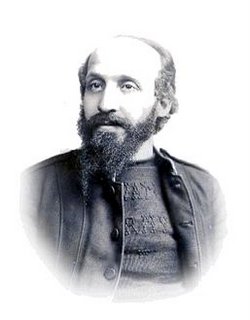“Some people like to argue that Wesley actually never testified to the holiness he recommended and preached.”Last week I determined to blog no more until I had personally resolved the outstanding issue of holiness in my life. What many have accused Wesley of was certainly true for me – I had not experienced the cause which I so enthusiastically championed!
Steve then went on to defend Wesley with the following quote from the Father of Methodism:
“Many years since I saw that 'without holiness no man shall see the Lord'. I began by following after it and inciting all with whom I had any intercourse to do the same. Ten years after, God gave me a clearer view than I had ever had before of the way how to obtain it, only by faith in the Son of God. And immediately I declared to all, "We are saved from sin. We are made holy by faith."10 years ago I was wonderfully saved – Hallelujah! My testimony can be found here. Since then God has been badgering me into a corner. Recently I (like Wesley) have discovered that the narrow way is ultimately blocked by a demand for entire sanctification and unless that sacrifice is made there is no way of travelling further. I have preached holiness, campaigned for it, defended it until I am blue in the face but I have not ‘testified to that which I recommend!’ No matter where I have looked all paths of enquiry have led back to holiness.
I have now by God's generous and undesreved grace resolved this matter once for and all and I can say with absolute confidence that God can and does (where he is allowed to) offer his children absolute deliverance from sin. Not just deliverance from the consequences of sin but deliverance from the disease itself.
I have over the last few days been negotiating that stumbling block we call holiness.
I began by making a list of all those things that were obviously sinful in my life and another list of all those things that were doubtful (as recommended by Booth in his ‘Ladder to holiness’.)
The big sins were relatively easy to identify and deal with it was the little compromises that proved awkward (things like taking time and resources from my employer – using the photocopier for personal use etc.) I also found that holiness would not settle for any degree of compromise and that everything however small or ‘doubtful’ had to go. This was a difficult process because some of this sin (especially the doubtful stuff) had embedded itself in my life so completely and needed almost surgical removal - the line between good and bad was at times perilously thin!
Once satisfied that this had been done (fully expecting God to reveal more as time goes on) I renounced all my sin both the obvious and the doubtful.
After that I surrendered everything I have and am to God in a solemn covenant in which I promised (by his grace and in accordance with his word) to obey him at all times and to refrain from all sin.
At last the great transaction was done! I was finally ‘my Lord’s and he was mine!”
Since then – dare I say - I have not sinned – I certainly have not consciously broken a known law of God – sometimes my humanity has caught me napping but generally the spirit via my conscience has been keeping me saved. In addition the desire to sin has vanished – the devil satisfied that I truly have placed all my resources on the altar knows that I have no capital available to spend on disobedience.
It is my firm intention to remain on this path for as long God lets me live – God knows how long it has taken me to find it. The bible tells me that such an ambition is both honourable and possible –for he has promised to keep ‘me blameless’ hallelujah!
I can now (and believe me I will!) preach holiness from a point of experience and with a clear conscience.
As for assurance, I have not had any mega-blessing (as yet) – a couple of delightful ripples have come my way but nothing major –However, I didn’t close the deal in order to get blessed! I did it because God requires holiness in the life of all believers.
Friends, believe me, God can and does deliver us from all sin and keep us blameless, holiness is not an antiquated Victorian form of extreme spiritual masochism it is a basic Christian requirement. It costs absolute renunciation of everything that hinders the work of the spirit and the total surrender of everything to God – but it is well worth the price!
Don’t follow mine or Wesley’s example and take 10 years to discover the blessing of holiness but do it today, every consecrated warrior brings global revival closer because without ‘holiness none shall see the Lord’
I am not merely ‘treated’ by the ‘wounds’ of Christ I am healed! The blood of Jesus is not some kind of spiritual steroid cream that temporarily removes unsightly symptoms it is the ‘balm’ that heals and ‘makes the wounded whole!”
Yours truly set apart by Christ, for the lost, in the Army
A




